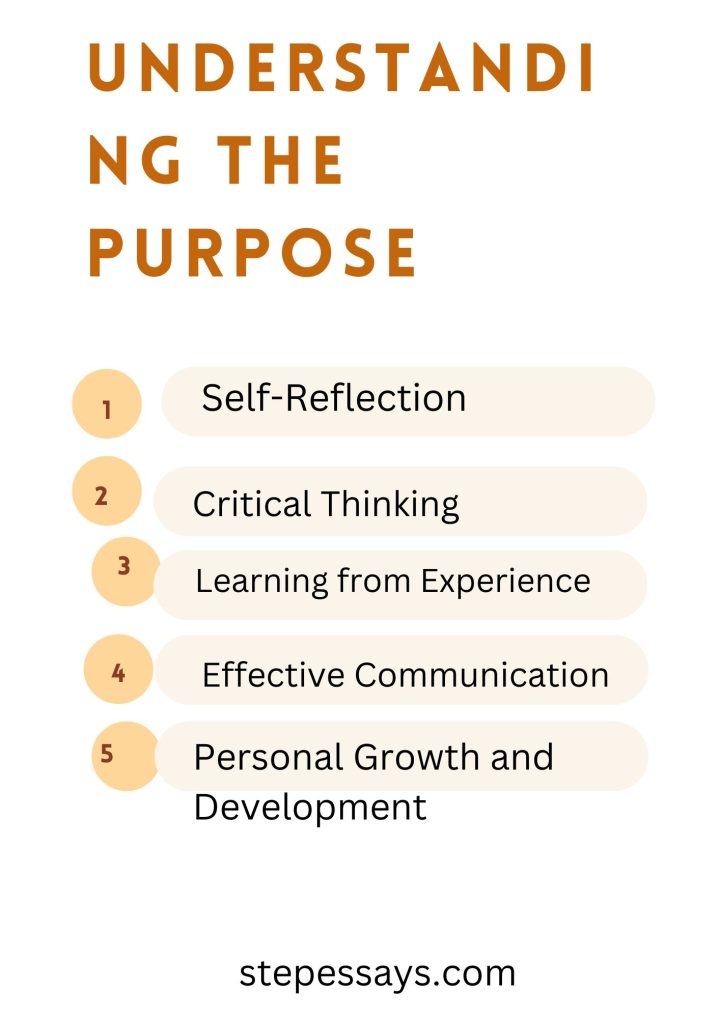Introduction
Reflective essays are a unique genre of academic writing that encourages individuals to look into their experiences, thoughts, and emotions. Unlike traditional essays that primarily focus on presenting arguments or analyzing data, reflective essays provide a platform for meditation and self-expression. They offer writers an opportunity to critically analyze their experiences, explore personal growth, and draw meaningful insights. In this comprehensive guide, we will look into the purpose of reflective essays, explore their key components, and provide practical tips for writing an effective reflective piece.
Understanding the Purpose:

Reflective
1. Self-Reflection:
Reflective essays serve as a tool for self-reflection, enabling individuals to examine their beliefs, values, and experiences. By engaging in meditation, writers can gain a deeper understanding of themselves and their actions, leading to personal growth and development.
2. Critical Thinking:
Writing a reflective essay requires critical thinking skills as writers analyze their experiences and evaluate their significance. They must question their assumptions, challenge their perspectives, and consider alternative viewpoints, fostering intellectual growth and self-awareness.
3. Learning from Experience:
Reflective essays facilitate learning from experience by encouraging individuals to reflect on past events or encounters. Whether it’s a personal triumph, a challenging situation, or a transformative journey, reflecting on experiences allows writers to extract valuable lessons and insights for future endeavors.
4. Effective Communication:
Reflective essays promote effective communication by encouraging writers to articulate their thoughts, feelings, and observations in a clear and coherent manner. By expressing themselves thoughtfully, writers can convey their message effectively to readers, fostering empathy, understanding, and connection.
5. Personal Growth and Development:
Ultimately, the purpose of a reflective essay is to facilitate personal growth and development. By engaging in self-reflection, critical thinking, and learning from experience, individuals can gain new perspectives, enhance their self-awareness, and become more resilient and adaptable in facing life’s challenges.
Key Components of a Reflective Essay:
1. Introduction:
The introduction sets the stage for the reflective essay by providing context for the reader. It may briefly outline the experience being reflected upon and introduce the main themes or questions that will be explored.
2. Description:
In this section, the writer describes the experience or event being reflected upon in detail. It is important to provide sufficient background information and context to help the reader understand the significance of the experience.
3. Reflection:
The reflection section is the heart of the essay, where the writer critically analyzes the experience and its impact. This involves exploring thoughts, feelings, and reactions, as well as identifying key insights or lessons learned.
4. Analysis:
In the analysis section, the writer goes beyond basic description and reflection to analyze the experience in-depth. This may involve examining underlying assumptions, evaluating the implications of the experience, and considering alternative perspectives.
5. Conclusion:
The conclusion summarizes the main points of the essay and reflects on the significance of the experience. It may also suggest implications for future actions or provide closure by highlighting the writer’s personal growth and development.
Practical Tips for Writing a Reflective Essay:
1. Be Honest and Authentic:
One of the most crucial writing tips for reflective essays is to be authentic in your expression. Authenticity is the cornerstone of effective reflection, as it allows the writer to honestly explore their thoughts, feelings, and experiences without pretense or artifice. Avoid the temptation to embellish or exaggerate, and instead, strive for genuine self-expression. Embrace vulnerability and share your raw emotions and candid observations, even if they may seem imperfect or uncomfortable. Authenticity not only fosters a deeper connection with the reader but also enhances the credibility and impact of your reflections. Remember, the essence of reflective writing lies in its ability to convey the genuine essence of your inner journey, so embrace your unique voice and perspective with sincerity and honesty.
2. Use Concrete Examples:
Support your reflections with concrete examples and anecdotes from your experience. This will make your essay more vivid and engaging, allowing readers to connect with your story on a deeper level.
3. Engage in Critical Analysis:
An essential writing tip for reflective essays is to reflect critically on your experiences and insights. Critical reflection entails more than just recounting events or emotions; it involves analyzing and evaluating your thoughts and actions with depth and discernment. Challenge assumptions, interrogate biases, and question the underlying meanings behind your experiences. Consider alternative perspectives and examine the implications of your reflections on yourself and others. By engaging in critical reflection, you can unearth deeper layers of understanding, uncovering hidden motivations and uncovering lessons that may not be immediately apparent. Embrace a spirit of inquiry and intellectual curiosity, allowing yourself to explore the complexities of your thoughts and experiences with honesty and rigor. Through critical reflection, you can transform your reflective essay into a profound exploration of self-awareness and personal growth.
4. Reflect on the Learning Process:
Reflect not only on the outcomes of your experiences but also on the learning process itself. Consider how you approached challenges, adapted to new situations, and grew as a result of your experiences.
5. Revise and Edit Carefully:
Conclusion:
Reflective essays serve a multifaceted purpose, providing a platform for self-reflection, critical thinking, and personal growth. By exploring experiences, reflecting on their significance, and analyzing their implications, writers can gain valuable insights into themselves and the world around them. By following the key components and practical tips outlined in this guide, you can write an effective reflective essay that resonates with readers and captures the complexity of your experiences and reflections.
